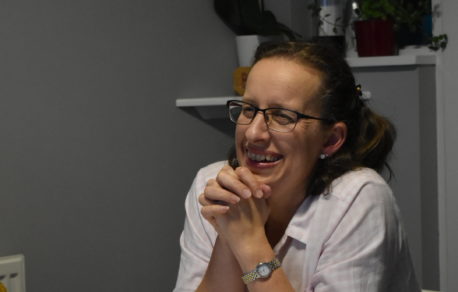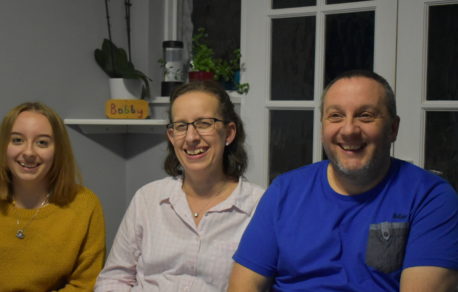
Living well with dementia
In advance of her upcoming webinar miniseries on dementia for Dementia Action Week 2022, BPS Chartered Psychologist Dr Kellyn Lee explores the impact dementia can have on people’s lives, how the concept of Material Citizenship can improve the wellbeing of those living with dementia, and the role Acceptance and Commitment Therapy plays in supporting carers and families to cope with the life-changing challenges that dementia brings.
Don’t forget to register for Dr Kellyn’s webinars on these topics, taking place on the 19th and 20th May, here.
What is dementia?
There are around 850,000 people in the UK living with dementia. And according to the Alzheimer’s Society, there are an estimated 670,000 people acting as primary unpaid carers. These are huge numbers and they are set to rise. Why? Because people are living longer.
Now let’s be clear, dementia is not an ‘old person’ disease (albeit you are more likely to be of an older age), nor is it a normal part of ageing.
Dementia is an umbrella term for around 7+ dementia diseases. In short, dementia is a decline in cognitive functioning (thinking, remembering, and reasoning) to such an extent that it interferes with a person’s daily life and activities.
There is no cure and damaged parts of the brain cannot be fixed. Drug therapy is modest at best, and it doesn’t work for everyone (or for very long) and has significant side effects too. Therefore, dementia is a life-limiting terminal condition.
So, this is the picture of dementia and whilst all of the above are true, I totally believe we can live well with dementia for longer if we understand how we feel about it (more on this in the second part of this blog) and if we look at it from a capabilities perspective – in other words, focusing on what people can do, rather than what they can no longer do.
Easy for me to say? Perhaps, but I do have over 11 years’ experience in the field of applied ageing and dementia research and therapeutic practice.
I have worked in community, care home and hospital settings and have seen first-hand how dementia can look worse because of a person’s environment and how they are treated by others. I have also seen how people can achieve and learn new things because of these two factors.
Material Citizenship and dementia
Material Citizenship is a concept I developed during my PhD, which constitutes a way of working with people with dementia that focuses on the everyday mundane tasks we do, and the objects we use to do them.
It feeds into and supports the maintenance of the person’s identity, and can also support improved psychological wellbeing.
Material Citizenship has been rolled out in care homes in England and Wales and is improving the lives of those who live, work and visit their loved ones in these settings. It also works in a person’s own home and can be supported by their family members.
I will discuss this in more detail during the first of my Foothold webinars for Dementia Awareness Week 2022, taking place on 19 May. In the webinar I will give you some examples of how Material Citizenship can:
- Help you support your loved ones to continue living the life they want to live, in their own homes for as long as possible
- Support a loved one to move into a care home if that time comes
- Support your existing relationship in a positive way.
REGISTER TO JOIN THE WEBINAR HERE.
Acceptance and Commitment Therapy for families of people living with dementia
Whilst caring for a person diagnosed with dementia can be rewarding, we also know that carers of people living with dementia are at higher risk of poor health due to stress, burnout, anxiety and depression. It is often considered that carers of people living with dementia are the invisible second patient when attending GP surgeries.
Many of us care for people, especially within families, but the nature of this care significantly changes when a diagnosis of dementia interrupts life.
For some carers and people diagnosed with dementia it is a relief, as it explains things that may have been happening which were a bit ‘off’ over recent months or even years. For others, it is a devasting blow and one that is difficult to deal with on an emotional level.
There are many organisations and charities that offer advice and support to people living with dementia. They can give practical advice and help people navigate the often difficult and fragmented social care services, but there is a lack of emotional support. This is where I combine my passion for dementia and therapeutic practice.
I have worked with many people over the years on a one-to-one and couples basis to help support them through the journey of dementia, the interruption it brings to relationships, the changes in relationships and the pain that people feel.
As human beings we are not well equipped to deal with a disease like dementia, as we cannot control what is going to happen, cannot find solutions to dementia-related challenges, and do not like living with uncomfortable thoughts and feelings.
I developed the We Care – Dementia Care programme with the help of Dr Ray Owen, an amazing clinical psychologist who has spent most of his life supporting carers in the NHS.
The We Care – Dementia Care programme focuses on the painful and unwanted thoughts and feelings carers often have when dementia enters their lives. It supports carers to normalise some of these thoughts and feelings, open up to the pain that dementia can bring and make mindful decisions that help them do more of the things that make them feel good, and less of the things that do not.
I will focus on this in my second Foothold webinar for Dementia Awareness Week 2022, taking place on 20 May. I look forward to sharing my knowledge and answering any questions people may have about caring for people with dementia.
REGISTER TO JOIN THE WEBINAR HERE.
In the meantime, here are some resources that you might find useful:
Dementia care videos
Material Citizenship: An ethnographic study exploring object–person relations in the context of people with dementia in care homes
How everyday objects can improve quality of life for people with dementia
For more information visit: www.dementiacarehub.co.uk
If you’d like to find out more about Material Citizenship and the We Care – Dementia Care programme, and how they can improve the lives of those who are affected by dementia, sign up to join Dr Kellyn’s upcoming webinar miniseries here.
If you care for someone with dementia and you’re a member of the engineering community, we may be able to support you. Find out about the support available here.
Meet the author
Dr Kellyn Lee
BPS Chartered Psychologist, Academic & Social Entrepreneur
Dr Kellyn Lee has spent 11+ years in ageing and dementia research. In 2019 she founded WISER Health and Social Care, which delivers Material Citizenship™ training to improve dementia care practice, and set up the Dementia Care Hub in 2021 to support people living in their own homes via community friendship groups and the We Care – Dementia Care programme.




